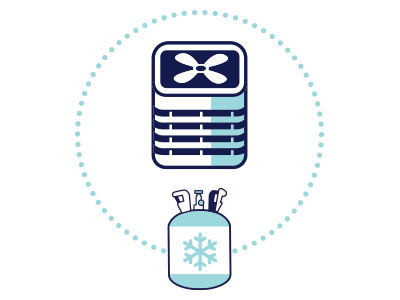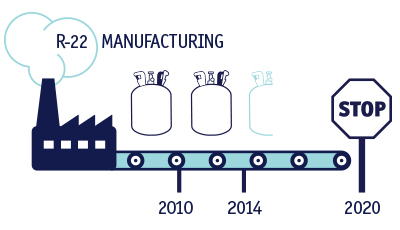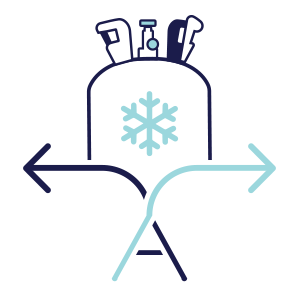Refrigerants and
Your Air Conditioner

What homeowners need to know about refrigerants and their A/C
Air conditioners are complex systems, with many moving parts that work together to keep your home cool. One of the most important pieces of the system is refrigerant. As a homeowner, you should understand the basics of how refrigerants work and how they impact repairs to your system.
Your home’s A/C needs refrigerant to provide you with cool air. These cooling compounds are mostly gases, and there are several different types that can be used with your A/C’s refrigeration cycle to control the climate in your home.
The most common types of refrigerant used in home A/C units have changed a lot over the years. As we learn more about environmental impacts, efficiency and other factors, new laws phase out different compounds. In fact, homeowners in the United States are in the midst of more changes right now.
What homeowners need to know about refrigerants and their A/C
The Environmental Protection Agency (EPA) enacted regulations to better protect the environment. These regulations phased out a certain ozone-depleting refrigerant called R-22 (commonly referred to as Freon®). Since 2015, regulations have prohibited manufacturers from making systems that use R-22.
But if your home’s A/C was manufactured before 2013, it probably uses R-22. That means how you get your A/C repaired in the future might be a bit different than it’s been in the past.


Why was R-22 phased out?
R-22 is an effective refrigerant, but it’s not great for the environment. As experts learned more about R-22 and its impacts on the Earth, they found that it depletes the planet’s protective ozone layer and contributes to the greenhouse gas effect.
As part of the Montreal Protocol, and then later as part of the Clean Air Act of 2010, the EPA mandated that the United States would cease the production and use of R-22 to help stem the harmful impact it has on the atmosphere.
Rather than banning the production of R-22 immediately, the EPA implemented a phase-out schedule to eliminate R-22 use over time. As part of this plan, supplies of R-22 were substantially reduced in 2014. On January 1, 2020, manufacturing or importing R-22 in the United States became illegal.
What does this mean for my home?
If you have an older A/C system, the new regulations will impact how it’s repaired. Don’t worry! You absolutely do not have to purchase a new A/C simply because of the R-22 ban. (Though you certainly can buy a newer and more energy-efficient model if you want to and can afford the cost.)
For example, if your A/C develops a leak and uses R-22, the regulations state that it can still be serviced using R-22. However, costs of R-22 are rising dramatically as supplies become scarce. “Topping off” with R-22 if your A/C develops a leak or other problem isn’t going to be cheap.
That’s why many homeowners are opting for a different solution: having their existing system retrofitted to use alternative refrigerants. These refrigerants are more affordable and better for the environment. However, converting to an alternative refrigerant does require labor and parts replacement to make the system compatible with a new compound.


Alternative refrigerants and your A/C
If you have an older A/C unit, you should read up on what alternative refrigerants are, why you might need them, your options for repairs and other frequently asked questions.
You don't have to be an HVAC technician to benefit from this information. Educated homeowners stay up to date on these changes, and it's not as complicated as you might think! This is your one-stop shop for everything you need to know about alternative refrigerants and what they mean for your home.
Frequently asked questions about air conditioners and refrigerants
What is a Refrigerant?
Refrigerants, also called coolants, are the chemical compounds that work with your air conditioning system to provide your home with cool air. R-22 is the most common type of refrigerant found in air conditioners that were manufactured before 2010.
There are different types of refrigerants, and the use of these compounds is regulated by the Environmental Protection Agency. That’s because their usage has an impact on the environment, and our understanding of that impact continues to develop and evolve over time.
WHAT IS R-22?
R-22 is a hydrochlorofluorocarbons (HCFC) and a type of refrigerant gas that has been used in air conditioning systems for many years.
The EPA’s Clean Air Act of 2010 mandated the phase-out of R-22 production, because researchers discovered that it depleted the ozone. The government mandated a 90% reduction in R-22 production by 2015, and a 99.5% reduction by 2020
HOW CAN I TELL WHEN MY AIR CONDITIONER WAS MANUFACTURED?
Manufacturers always include the date of manufacture in the air conditioning unit’s serial number, though they can be displayed differently.
The manufacture date, sometimes written as MFG date, usually appears on the nameplate of your A/C unit, near your serial and model number.
If you can’t find the manufacture date, but you do see the serial number and model number, simply enter the serial number, model number, and the brand name of your A/C into any search engine. It should bring the manufacture date up for you.
WHAT ARE ALTERNATIVE REFRIGERANTS?
Since HCFCs like R-22 were found to be environmentally damaging, it was determined that there needed to be another option. Alternative refrigerants are classified as hydrofluorocarbons (HFCs) and they don’t contain any ozone-depleting chlorine. Aside from being better for the environment, they’re more affordable than R-22, work efficiently and increase the serviceability of your A/C unit.
If your air conditioner uses R-22 and develops a leak or needs another repair, your HVAC technician may recommend that your existing A/C unit be retrofitted to accept an alternative refrigerant.
To learn more about the benefits of alternative refrigerants, click here.
CAN’T I JUST USE AN ALTERNATIVE REFRIGERANT IN MY OLDER AIR CONDITIONING SYSTEM?
If your air conditioner uses R-22 refrigerant, you can’t just top off with an alternative refrigerant. Your system would need to be retrofitted in order to allow the use of alternative refrigerants.
WHAT DOES IT MEAN TO “TOP OFF,” “RECHARGE” OR PERFORM A “GAS AND GO” ON AN AIR CONDITIONING SYSTEM?
When talking about adding more refrigerant to an air conditioning unit, technicians refer to the process as “topping off” or “recharging”.
Essentially, the chemical refrigerant inside of the unit is being refilled. When you hear the term “charging” it’s also a reference to adding refrigerant into the air conditioning system.
CAN I TOP OFF MY AIR CONDITIONER BY MYSELF?
No, you cannot top off your air conditioner’s refrigerant on your own. Federal law regulates the use and installation of refrigerants and special licensure and/or certifications are required for the professionals who work with these chemicals.
HOW CAN I TELL WHEN MY AIR CONDITIONER NEEDS MORE REFRIGERANT?
When your air conditioner needs to be topped off or recharged with more refrigerant, one of the first signs is warm or room temperature air.
However, there could be any number of reasons for a malfunctioning air conditioner. If you have a Home Warranty Service Agreement from 2-10 HBW, you can place a request for service and 2-10 HBW will dispatch a service contractor to your home. If you do not have a Home Warranty Service Agreement, you should call an HVAC technician to assess your system’s functionality.
WHAT SHOULD I DO IF MY AIR CONDITIONER BREAKS DOWN?
If you think you might have a problem with your air conditioner and you have a Home Warranty Service Agreement from 2-10 HBW, you can place a service request and 2-10 HBW will dispatch a service contractor to your home. If you do not have a Home Warranty Service Agreement, you can call an HVAC technician to assess your system’s functionality.
IS IT ILLEGAL TO BUY AN AIR CONDITIONER THAT USES R-22?
This is a problem you’re unlikely to encounter, since the manufacture and installation of new equipment using R-22 is now illegal.
Remember that you can still continue to service and maintain your existing air conditioner, even if it uses R-22. You just can’t install a new air conditioner that uses R-22.
HOW MUCH DOES IT COST TO USE AN ALTERNATIVE REFRIGERANT?
The costs of retrofitting an existing air conditioner to use alternative refrigerants will vary depending on the type of retrofitting that’s needed.
WHY CAN’T I JUST HAVE LEAKS IN MY A/C REPAIRED?
Yes. There are products in the market that can do an immediate and effective job of repairing and sealing refrigerant leaks even if the technician cannot find the leak’s location.
WHY WOULD MY AIR CONDITIONER NEED ALTERNATIVE REFRIGERANT?
Air conditioners can develop leaks over the course of normal use, which is one of the primary reasons your refrigerant would need to be topped off.
If your air conditioner was manufactured before 2013, it likely uses R-22 refrigerant. Due to EPA regulations this gas is good as gold — it’s expensive and hard to find.
WHAT IF MY R-22 IS ONLY SLIGHTLY LOW? WILL TOPPING OFF BE CHEAPER OR EASIER?
Topping off an A/C system with a known leak is illegal, but once the leak has been diagnosed and addressed by an HVAC technician, it can be a viable practice. Topping off with R-22 may be more economical in the short term. But, in the long run, R-22 is becoming more difficult to find, and that’s if you can find a technician who will even work with R-22 (many will simply refer you to someone else). Further, the technician can guesstimate how many pounds you’ll need, but you won’t know the final count until the refrigerant is being replaced.
WHAT DOES THE RETROFITTING PROCESS LOOK LIKE?
The retrofitting process will look different based on the type of alternative refrigerant being used. Some retrofits are easy and straightforward, with minimal or no equipment replacements needed.
Other retrofits are more complex and require additional components. For more information on how an air conditioner gets retrofitted, review How An Air Older Air Conditioner Gets Retrofitted For Alternative Refrigerants.
DO ALTERNATIVE REFRIGERANTS DEPLETE THE OZONE LAYER?
No, alternative refrigerants do not deplete the ozone layer, which is why the EPA is phasing out R-22 and mandating the use of these new compounds.
SHOULD I REPLACE MY OLD AIR CONDITIONER IF IT ISN’T BROKEN YET?
If having a new, modern, and more efficient system is important to you, you might consider replacing your air conditioner.






